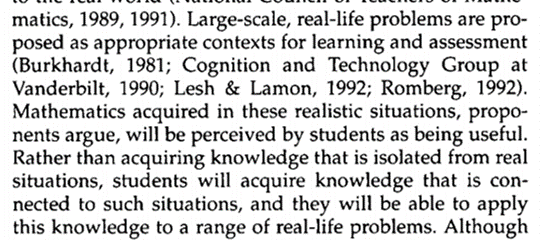I have been sent this paper (on problematising mathematics) and am confused. Am I missing something…?
The paper argues (argued, in 1996) that maths reform is best achieved through problematising maths:

In-practice, this focuses on students doing their own reasoning, problem-solving rather than practising; learning but not being taught.


It seeks to go beyond what it describes as a historic split between acquiring knowledge (in school) and applying it (out of school):

The paper advocates ‘understanding’ maths (Is this separate from ‘knowing’ or ‘being able to do’ maths? This seems unlikely to me, but I’m not a mathematician)? (I know maths gets broken down into sub-domains, but this is _only_ advocating understanding).

The teacher’s role is to create a community – although they should not be constrained from sharing some information with students…


The most important result of this approach – residue – is strategic skills.
So a good task is one which students can problematise and which leaves a residue (H10) and such problems can come from anywhere.


My questions:
- Is this contrary to what we know from cognitive load theory?
- Do ‘strategic skills’ = ‘weak methods’?
- Will a carefully-tailored task leave a better residue than a student-generated one?
- Does this rely on procedural knowledge, but build it inefficiently
I can see how students problematising an idea might make it more engaging (the authors say that’s not what they seek), and that this is a good approach to take. But it seems to me that this must rely on a bedrock of knowledge and skills.
Is there an argument I’m missing here, or a subtlety to the function of problematising that I’m missing?
I might be guilty of extrapolating too much but I think this sort of thinking is at the heart of the “new maths” which came into vogue in NZ in the 90’s. Get students to ‘understand’ the maths at all costs by helping them develop multiple strategies and approaches to solving problems. Result = confusion and significant underachievement which continues to be reflected in our international maths results to this day. Students, particularly at primary level, need to be taught straight forward algorithms to solve standard problems like long addition, multiplication etc. Nothing comes close to explicit instruction – worked examples and practice, for effectiveness. There is a good discussion of the “maths wars” in the US over this issue in Eric Kalenze’s book “Why America’s Education System is Upside Down” if you are interested.
LikeLike
This would be my reading too – but I was hoping someone would show me where I was wrong. Thanks for the book recommendation.
LikeLike